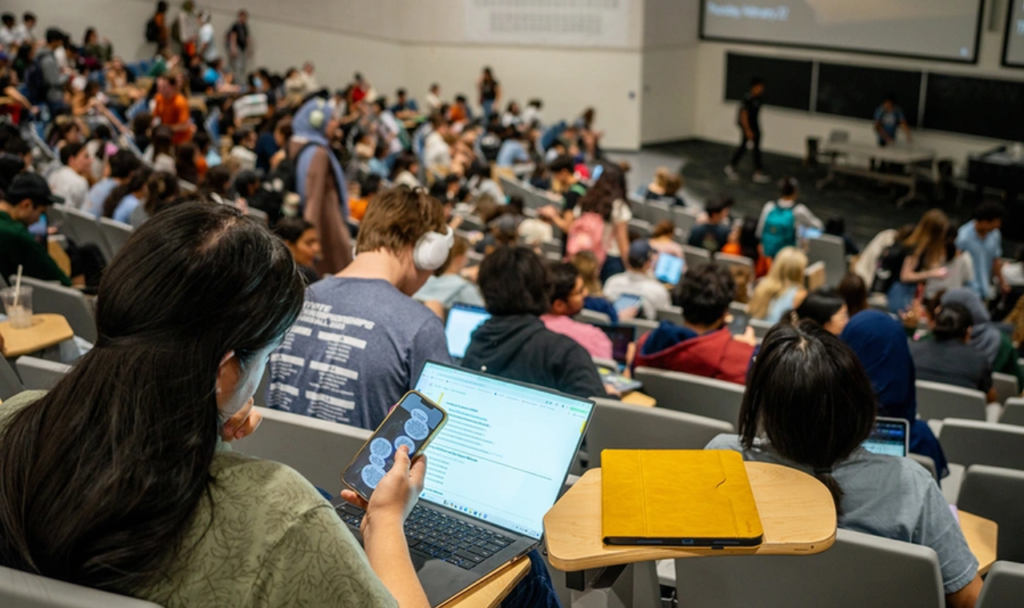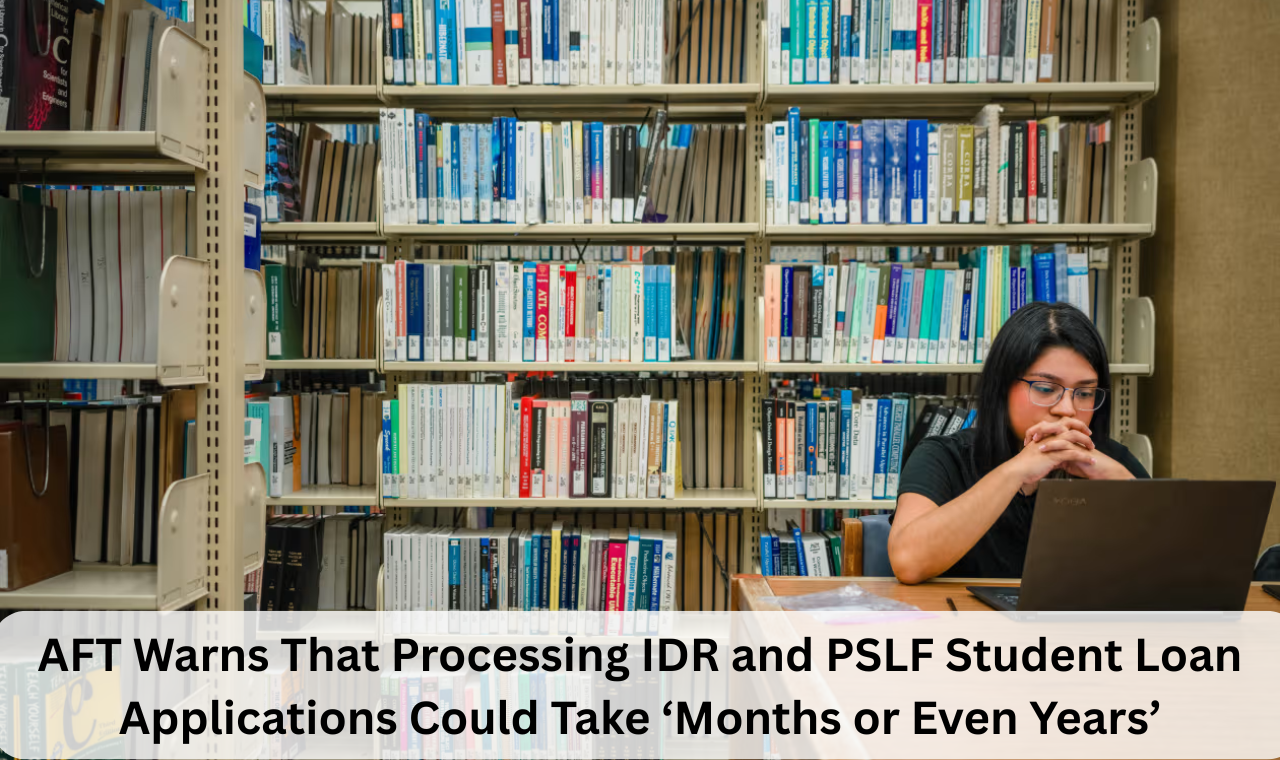The American Federation of Teachers (AFT) has raised concerns over significant delays in processing student loan applications for Income-Driven Repayment (IDR) plans and Public Service Loan Forgiveness (PSLF), warning that it could take “months, if not years,” for applications to be fully processed. With millions of borrowers affected, these delays are causing frustration and uncertainty among those relying on these programs for financial relief.
- Delays in IDR and PSLF Applications: The Department of Education has halted processing for IDR applications, affecting millions of borrowers seeking affordable repayment options and loan forgiveness.
- Impact of Court Ruling: A court decision blocked the SAVE plan, leading to the removal of online access to applications for multiple IDR plans, including IBR, PAYE, and ICR.
- AFT Lawsuit: The AFT filed a lawsuit against the Department of Education, claiming the suspension violates federal law and hinders borrowers’ progress toward PSLF.
- Reopened Applications: In response to the lawsuit, the Department of Education reopened applications for certain IDR plans and loan consolidation in March 2025, but REPAYE and SAVE plans remain unavailable.
- Uncertain Processing Timeline: Despite reopening applications, there is no clear timeline for when processing will begin, leading to uncertainty for borrowers.
- Public Service Workers Affected: The delays particularly impact public service workers, who rely on PSLF to have their federal student loans forgiven after 10 years of qualifying payments.
- Possible Financial Strain: Borrowers face continued financial strain, with higher monthly payments and delays in achieving loan forgiveness.
- Legal Action and Advocacy: The AFT is actively advocating for changes, and organizations like the Student Borrower Protection Center are supporting borrowers throughout this process.
Uncertainty in Application Processing
In recent months, the U.S. Department of Education (ED) has faced intense scrutiny regarding the processing of student loan applications. The issue came to a head in February 2025, when ED removed online access to applications for several IDR plans, including Income-Based Repayment (IBR), Pay As You Earn (PAYE), Income-Contingent Repayment (ICR), and loan consolidation. This move followed a court ruling blocking the Saving on a Valuable Education (SAVE) plan, which had been designed to offer more flexible repayment options for borrowers.
In response to the court decision, the Department of Education instructed loan servicers to halt processing all IDR applications. This disruption affected millions of borrowers who were seeking to enroll in more affordable repayment plans or make progress toward loan forgiveness through PSLF.
The AFT, a national labor union representing educators and public service workers, has been vocal about the impact of these delays. The union filed a lawsuit against the Department of Education, arguing that the suspension of IDR applications violates federal law and undermines borrowers’ progress toward PSLF. Specifically, the AFT claims that the halted processing is making it more difficult for public service workers to benefit from the loan forgiveness program, which was created to support employees working in government or nonprofit sectors.
A Timeline of the Crisis
- February 2025: ED removed online access to IDR applications for IBR, PAYE, ICR, and loan consolidation.
- March 2025: Following public pressure and a lawsuit, the Department of Education reopened applications for certain IDR plans and loan consolidation. However, REPAYE and SAVE plans are still unavailable.
The Impact on Borrowers
The delays in processing IDR and PSLF applications are particularly troubling for borrowers working in public service. Public service workers, such as teachers, healthcare professionals, and nonprofit employees, rely on PSLF to have their federal student loans forgiven after making 10 years of qualifying payments. However, with applications delayed, many borrowers fear that they will not meet the necessary criteria to have their loans forgiven on time.
For many of these individuals, the lack of progress in their applications could result in continued financial strain, as they may be stuck paying higher monthly loan amounts under standard repayment plans. The delay also undermines the promise of PSLF, which was designed to help individuals working in public service reduce their student loan burdens.

Legal Action and Future Outlook
In response to the delays, the AFT filed a lawsuit against the Department of Education in early 2025, demanding that the suspension of IDR applications be lifted. The union argued that the halt in processing violates federal law, which mandates that borrowers be given access to repayment plans and loan forgiveness programs. The lawsuit also claims that the Department of Education’s actions have put public service workers in a precarious position, potentially delaying their loan forgiveness and further exacerbating the financial challenges they face.
The legal battle highlights the growing frustration with the Department of Education’s handling of student loan relief programs. The ongoing uncertainty has left borrowers feeling uncertain about the future of their loans, particularly those working in public service sectors.
What Borrowers Can Do
For those affected by the delays, it is crucial to stay informed and take proactive steps. Borrowers are advised to:
- Regularly check the Federal Student Aid website for updates on the status of IDR and PSLF applications.
- Keep detailed records of all communications and submissions related to their loan applications.
- Seek assistance from organizations like the AFT or the Student Borrower Protection Center, which can offer guidance and support.
Conclusion
The ongoing delays in processing IDR and PSLF applications are causing significant uncertainty and financial strain for millions of student loan borrowers. As the legal battle continues and the Department of Education reopens applications for certain plans, borrowers remain in limbo, unsure when or if their loans will be forgiven.
For more information on student loan repayment plans, borrowers can visit the Federal Student Aid website. Updates on the status of PSLF and IDR applications can also be found on the Student Borrower Protection Center’s website.
Until then, borrowers must remain vigilant and prepared for a potentially prolonged wait as the Department of Education works to resolve these issues.

Pankaj Kumar is a skilled content writer at OTE News, focusing on breaking news, technology, and socio-political developments. With a background in Mass Communication, he brings a balanced perspective to his articles, ensuring clarity and reliability. Pankaj has a knack for simplifying complex topics for readers.
In his free time, he enjoys photography, traveling, and experimenting with new cuisines. His curiosity and dedication to truthful reporting make him a valuable contributor to OTE News.




